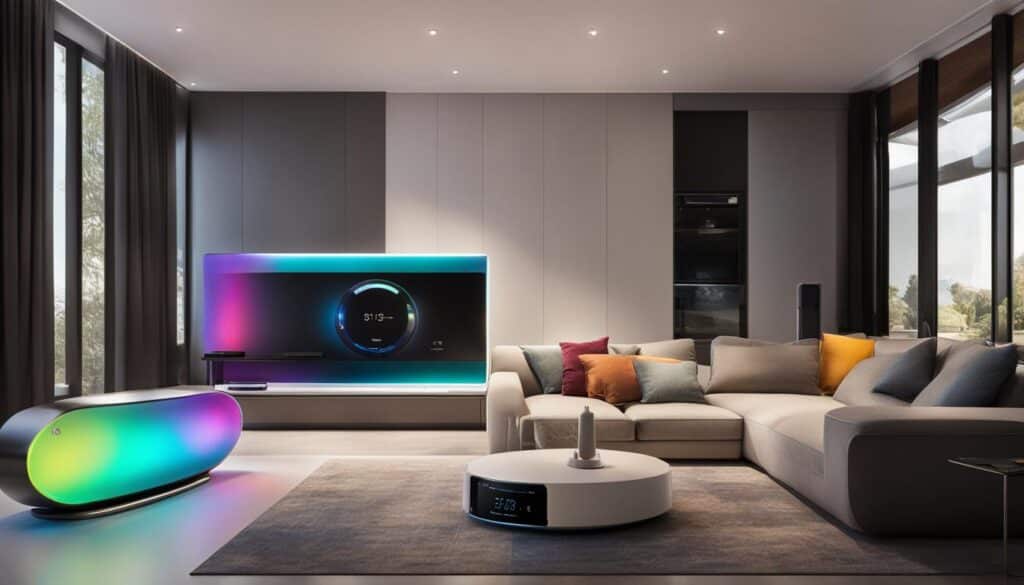Voice control platforms offer a hands-free way to operate lights, thermostats, door locks, and more. The availability of various voice-controllable devices such as interactive voice assistants and smart speakers from companies like Josh.ai, Apple, Amazon, and Google has made controlling smart homes through voice commands possible and enjoyable.
Over a quarter of US adults currently own a smart speaker, and this number is predicted to rise to 55 percent by 2022. Voice control has gained popularity as the preferred method of controlling smart devices in homes for people of all ages and genders. Voice control systems have improved over time with more advanced microphones, speech recognition engines, and integration with popular home control systems, allowing for more intelligent and comprehensive voice commands. Smart speaker ownership increased by 40% in 2018, reaching 66.4 million adults in the US.
Table of Contents
Key Takeaways:
- Voice control platforms offer a hands-free way to operate smart home devices.
- Companies like Josh.ai, Apple, Amazon, and Google provide interactive voice assistants and smart speakers.
- Over a quarter of US adults currently own a smart speaker, and this number is predicted to rise to 55 percent by 2022.
- Voice control systems have improved over time with more advanced technology.
- Smart speaker ownership increased by 40% in 2018, reaching 66.4 million adults in the US.
The Benefits of Voice Control in Smart Homes
Voice control in smart homes offers several benefits. It allows for hands-free operation, making it more convenient and accessible for people with busy or occupied hands. Voice-activated home automation simplifies tasks such as adjusting lights, playing music, setting thermostats, and more, eliminating the need to manually interact with keypads, touch panels, smartphones, or remotes.
By leveraging smart home voice assistants, voice control enhances the overall experience of using smart home devices by providing a seamless and intuitive interface through voice commands. Whether you want to dim the lights, change the temperature, or stream your favorite playlist, a simple voice command can make it happen.
Voice assistants in smart homes are not limited to basic commands. They can provide information, manage home security, and control connected devices, making them valuable tools for daily routines. Need to know the weather forecast, set a reminder, or even order groceries? Just ask your voice assistant.
Voice control transforms the way we interact with our smart homes, offering a new level of convenience, accessibility, and efficiency. It empowers users to operate their homes effortlessly, simplifying tasks and improving the quality of life.
With voice-activated home automation, controlling your smart home becomes as easy as speaking. Gone are the days of fumbling for switches or searching for remotes. Voice control brings a new dimension of intelligence and hands-free operation, making everyday tasks more effortless and enjoyable.
Popular Voice Control Systems for Smart Homes
When it comes to voice control systems for smart homes, there are several popular options available. Let’s take a closer look at some of the top contenders:
1. Google Assistant: Known for its accuracy and advanced capabilities, Google Assistant has become a preferred choice for many smart home enthusiasts. With an extensive range of customization options, Google Assistant allows users to personalize their voice-activated home automation experience.
2. Apple Siri: Apple’s voice assistant, Siri, offers excellent multilingual support and seamlessly integrates with Apple’s home automation platform, Homekit. Siri allows users to control their voice command home automation devices effortlessly, catering to the needs of Apple ecosystem users.
3. Amazon Alexa: Alexa, the voice assistant developed by Amazon, is renowned for its intelligence and wide compatibility with various smart devices. Alexa’s robust shopping experience, extensive device integration capabilities, and constant improvements make it a popular choice among voice-controlled smart home technology users.
Each voice control system has its own set of advantages and features, allowing users to choose the one that best suits their specific needs and preferences. Factors such as compatibility with existing smart devices and ecosystems play a crucial role in deciding which voice assistant to opt for.
Below is a table summarizing some key features of these popular voice control systems:
| Voice Control System | Advantages |
|---|---|
| Google Assistant | Accurate responses, extensive customization |
| Apple Siri | Strong multilingual support, integration with Apple Homekit |
| Amazon Alexa | Intelligence, wide device compatibility, robust shopping experience |

Insights:
Google Assistant provides extensive customization options, allowing users to personalize their smart home experience to their preferences. Apple Siri is ideal for users within the Apple ecosystem, as it seamlessly integrates with Apple’s Homekit. Amazon Alexa stands out with its intelligence, wide device compatibility, and robust shopping experience.
As the voice-activated home automation market continues to evolve, these popular voice control systems will likely further enhance their features and capabilities, providing users with even more intelligent and intuitive smart home experiences.
Challenges and Concerns of Voice Control in Smart Homes
Voice control in smart homes offers numerous benefits, but it also comes with its fair share of challenges and concerns. One of the main concerns is the potential invasion of privacy and security risks associated with using voice assistants and smart speakers. The lack of robust security features in mass-market voice assistants makes them vulnerable to potential hacking attempts, leaving users exposed to the risk of unauthorized access to their smart home devices and personal information. This has resulted in consumer distrust towards these devices and raised questions about the safety of using voice-controlled smart home devices.
However, it is important to note that not all voice control systems are created equal in terms of privacy and security. Professional solutions like Josh.ai offer advanced privacy features and are designed to be installed by certified professional integrators, providing a more secure alternative for those concerned about their privacy and data security.
Another challenge of voice control in smart homes is voice recognition. While voice assistants have made significant advancements in understanding and interpreting human speech, there can still be challenges in environments with excessive noise or when it comes to understanding accents or speech patterns that the voice assistant may not be accustomed to. This can result in frustration, especially when voice commands are not accurately recognized or when the voice assistant fails to respond appropriately.
Addressing Privacy and Security Concerns
Privacy and security should be top priorities when it comes to implementing voice control in smart homes. To address these concerns:
- Choose a voice control system that prioritizes data privacy and implements robust security measures. Opt for professional solutions that are designed with built-in security features and offer transparency in their data handling practices.
- Regularly update your voice assistant device and associated apps to ensure you have the latest security patches and enhancements.
- Consider implementing additional security measures, such as strong Wi-Fi passwords, two-factor authentication, and network segmentation to protect your smart home devices and personal information.
- Be cautious about the information you share with your voice assistant and review the privacy settings and permissions associated with your device and apps. Disable features or permissions that you feel may compromise your privacy.
Improving Voice Recognition Accuracy
To improve voice recognition accuracy when using voice control in smart homes:
- Speak clearly and at a moderate pace to enhance voice assistant understanding.
- Reduce background noise by minimizing distractions in the environment.
- Ensure your voice assistant device is placed in an optimal location for capturing your voice commands.
- If you experience persistent issues with voice recognition, consider reaching out to the voice assistant manufacturer for troubleshooting or explore alternative voice control options that may better suit your speech patterns or accent.
The Future of Voice Control in Smart Homes
The future of voice control in smart homes holds promising advancements. As technology continues to improve, speech recognition systems are expected to become more accurate and capable of handling various accents and disruptions. Integration with a wide range of smart devices will also expand, allowing for a more comprehensive and unified home automation experience. The demand for voice assistants is growing, with an estimated 8 billion more voice assistants expected to be operational by 2023, indicating a continued interest and adoption of this technology in smart homes.

With the rapid pace of technological advancement, the future of voice control in smart homes looks bright. Improved speech recognition systems will enable a more seamless and natural interaction between users and their smart devices. As voice assistants become more integrated into our daily lives, the possibilities for voice-activated home automation will expand.
One area of focus for future development is the enhancement of speech recognition accuracy. While current voice control systems have made great strides in understanding and responding to voice commands, there is still room for improvement. The future holds the promise of even more accurate and reliable voice recognition technology, capable of understanding and interpreting various accents, dialects, and speech patterns.
Voice Control Integration with Smart Devices
Integration with a wide range of smart devices is another exciting prospect for the future of voice control in smart homes. With improved interoperability and compatibility, voice assistants will be able to seamlessly connect and control a multitude of devices, including lights, thermostats, security systems, and more. This integration will enable users to have a truly unified and streamlined smart home experience, where all aspects of their home can be controlled effortlessly through voice commands.
Expanded Capabilities and Features
The future of voice control in smart homes will also bring expanded capabilities and features to enhance the user experience. Voice assistants will continue to evolve, offering more personalized and tailored responses to individual users. These advancements will enable voice-controlled smart home technology to understand user preferences, learn from their behaviors, and provide proactive suggestions and automation.
The Growing Demand for Voice Assistants
The demand for voice assistants is on the rise, indicating a growing interest and adoption of voice-activated home automation. With voice assistants becoming more accessible and affordable, an increasing number of households are incorporating this technology into their smart homes. By 2023, the number of voice assistants in operation is projected to reach 8 billion, highlighting the widespread use and acceptance of this innovation.
Choosing the Right Voice Assistant for Your Smart Home
When it comes to creating a voice-activated home automation system, choosing the right voice assistant is crucial. With the wide array of voice-controlled smart home devices available, finding the perfect fit for your smart home can seem overwhelming. However, by considering a few key factors, you can ensure that your voice assistant seamlessly integrates with your existing smart devices and meets all your automation needs.
Compatibility
First and foremost, consider the compatibility of the voice assistant with your current smart home setup. Some voice assistants are designed to work exclusively with specific platforms or ecosystems, so it’s essential to choose one that is compatible with the devices you already own. Whether you have Google Nest products, Apple HomeKit devices, or Amazon Echo devices, make sure the voice assistant you select can fully integrate with your existing ecosystem.
Features and Capabilities
Assessing the features and capabilities of each voice assistant is crucial in making the right choice. Look for voice assistants that offer high accuracy in recognizing and executing voice commands. Customization options such as creating routines, setting up personalized voice profiles, and adjusting speech settings can enhance your experience. Multilingual support is also vital if you require voice assistant interactions in multiple languages. Additionally, consider how well the voice assistant integrates with popular home automation systems you rely on for controlling your smart devices.
Choosing Based on Preferences and Needs
Ultimately, selecting the right voice assistant for your smart home boils down to personal preferences and specific needs. Take into account the unique functionalities you desire for your smart home. If you prioritize smart shopping experiences, Amazon Alexa might be the ideal choice. On the other hand, if you value privacy and a professional-grade solution, platforms like Josh.ai provide advanced privacy features and integration with certified professional integrators.
Remember that your voice assistant will be the central hub of your smart home, so taking the time to evaluate compatibility, features, and personal preferences is vital to ensure a seamless and personalized experience.
Conclusion
Voice control systems have revolutionized the way we interact with our smart homes, offering a convenient and intuitive solution for operating various devices. With the ability to achieve hands-free operation, these systems simplify daily routines and enhance the overall home automation experience.
Among the popular voice control systems, Google Assistant, Apple Siri, and Amazon Alexa stand out, each bringing their unique strengths and features to the table. When choosing a voice assistant for your smart home, it’s essential to consider the benefits and challenges associated with voice control. Evaluate the compatibility of the systems with your existing smart devices and select one that best suits your needs.
The future of voice control in smart homes looks promising, thanks to advancements in speech recognition technology and expanding integration possibilities. As these systems continue to evolve, we can expect even more accurate and robust voice recognition, making them capable of handling various accents and disruptions. The increasing demand for voice assistants further emphasizes the growing interest in this technology within smart homes.
The key to unlocking the full potential of your smart home lies in choosing the right voice assistant. By selecting a system that aligns with your preferences, needs, and desired functionalities, you can elevate your home automation experience and enjoy seamless control over your connected devices. Embrace the power of voice control systems and embrace a smarter, more convenient way of living in your smart home.
FAQ
What is voice control in a smart home?
Voice control in a smart home refers to the ability to operate various smart devices such as lights, thermostats, door locks, and more, using voice commands.
What are the benefits of voice control in smart homes?
Voice control in smart homes offers hands-free operation, simplifies daily routines, and enhances the overall home automation experience.
What are some popular voice control systems for smart homes?
Some popular voice control systems for smart homes include Google Assistant, Apple Siri, and Amazon Alexa.
What are the challenges and concerns of voice control in smart homes?
Some challenges and concerns of voice control in smart homes include potential privacy and security risks, as well as difficulties with voice recognition in certain environments or accents.
What does the future hold for voice control in smart homes?
The future of voice control in smart homes looks promising with advancements in speech recognition and expanded integration possibilities.
How do I choose the right voice assistant for my smart home?
To choose the right voice assistant for your smart home, consider the compatibility with your existing smart devices, assess the features and capabilities of each voice assistant, and select one that aligns with your preferences and needs.


